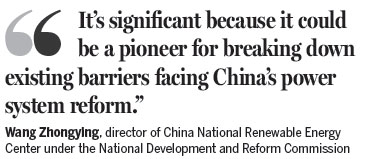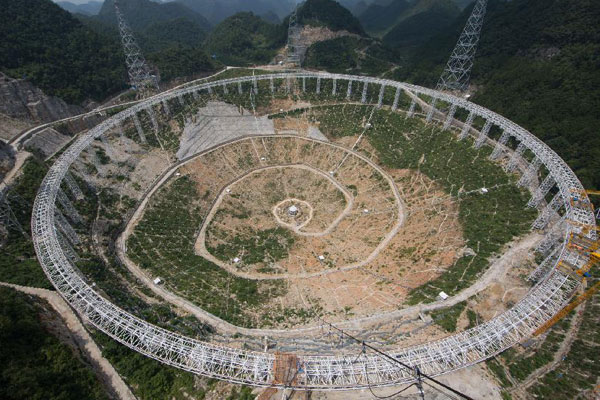City to be first renewable energy pilot zone
Updated: 2015-07-30 07:57
By Lan Lan(China Daily)
|
||||||||
Zhangjiakou in the northwest of Hebei province has been approved as the country's first renewable energy pilot zone, an initiative that could also help Beijing resolve its air pollution problem.
Beijing and Zhangjiakou have jointly applied to co-host the 2022 Winter Olympic Games. The International Olympic Committee will select the 2022 host on Friday.
The city, about 200 kilometers from Beijing, has abundant wind, solar and biomass resources and has set a goal to establish a world leading "low-carbon Olympic zone".
The city aims to increase renewable energy generation of its total electricity consumption to 55 percent by 2020, according to a development plan approved by the State Council, China's Cabinet.
That is an ambitious goal, said experts. In comparison, Germany aims to increase renewable energy generation to 40 to 45 percent of total electricity production by 2025.
If the city wins the bid, the Olympic Center and other stadiums or sports arenas will be 100 percent powered by renewable energy, Wu Weidong, deputy mayor of Zhangjiakou, told a news conference in Beijing on Wednesday.
All city public transportation, about 40 percent of urban residents' power consumption, and half of commercial and public building power consumption will be generated from renewable energy by 2020.
About 40 percent of industrial enterprises in the city should realize zero emission by 2020, he said.
By 2020, the city's installed capacity of renewable energy is set to reach 20 million kilowatts, with an annual power generation capacity of 40 billion kWh. "It could also provide clean energy for the (Beijing-Tianjin-Hebei) region and alleviate the air pollution facing this area," Wu said.
More than 90 percent of electricity consumption in the Beijing-Tianjin-Hebei region was generated from fossil fuels last year, according to official data.
It is the first renewable energy pilot zone approved by the State Council, said Wang Zhongying, director of the China National Renewable Energy Center under the National Development and Reform Commission.
"It's significant because it could be a pioneer for breaking down existing barriers facing China's power system reform," said Wang.
Hebei province experienced some of the worst air pollution in the past few years and has escalated efforts to combat it.
The central government asked the province to reduce 60 million metric tons of iron and steel production by 2017, partly to significantly reduce the use of coal, a major contributor to air pollution.
Ren Zhiwu, deputy director general of the department of high-tech industry at the energy center, said the key issue is to realize economic restructuring by making emerging industries a new pillar for growth.
The value-added output of emerging industries in Zhangjiakou, including new energy, big data, new material and renewable energies, is expected to rise to 15 percent of its local GDP in 2020 and 30 percent by 2030, said officials.
lanlan@chinadaily.com.cn

(China Daily 07/30/2015 page4)

 US Marines Corpos soldiers demonstrate martial arts
US Marines Corpos soldiers demonstrate martial arts
 World's largest radio telescope being built
World's largest radio telescope being built Elvis Festival pays tribute to the King of Rock 'n' Roll
Elvis Festival pays tribute to the King of Rock 'n' Roll
 Four-color rice turns paddy field into artwork
Four-color rice turns paddy field into artwork
 Images capture modern life of a warrior monk
Images capture modern life of a warrior monk
 The world in photos: July 20 - 26
The world in photos: July 20 - 26
 Amazing landscape of China in white and black
Amazing landscape of China in white and black
 Across America over the week (July 17- July 23)
Across America over the week (July 17- July 23)
Most Viewed
Editor's Picks

|

|

|

|

|

|
Today's Top News
Embassy continues its work in aftermath of car bombing
Netizens pack heavy wallets
Delta's stake in China Eastern boosts partnership
Beijing condemns Somali attack, mourns deaths
Panda 'fakes pregnancy' to get better living conditions
China eyes deepened cooperation with overseas NGOs
Monster Hunt breaks Chinese box office record
Olympic bid panel cites city's merits
US Weekly

|

|






